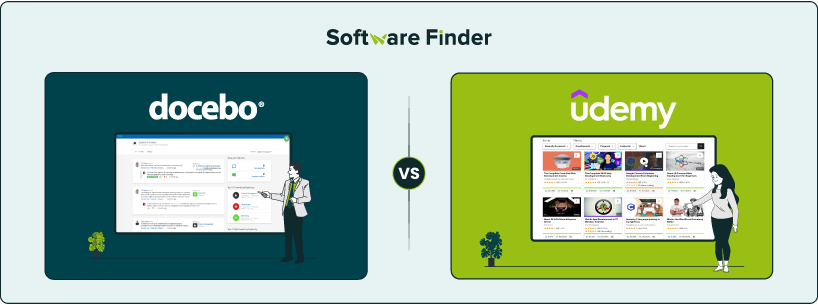
Artificial intelligence (AI) and learning management systems (LMS) complement each other seamlessly in today’s performance-oriented landscape. Their confluence ensures optimized workflows and improved learning outcomes. However, automation and intelligent analytics alone are not enough. An ideal LMS should also include core features such as content management, learning pathways, and integration capabilities.
Docebo LMS and Udemy Business are two such platforms, combining AI capabilities with enterprise-grade scalability and performance. Whether it’s employee engagement, upskilling, or compliance training, both LMSs cater to diverse organizational needs. This guide explores their features and functionalities in depth. Let’s dissect them in detail!
Features | Docebo | Udemy Business |
Content Creation | ‘Docebo Creator' offers drag-and-drop, interactive elements, assessment creator, AI-powered creation tools | ‘Role Play’ feature along with video and audio options, lecture descriptions, quiz generator and assessment builder |
Immersive Learning | Hands-on learning, gamified learning | Hands-on learning, Udemy pathways, cohort learning |
AI Capabilities | Complete automation, search engine, auto-tagging, auto skill assignment, content recommendation | Generative AI Upskilling, AI powered recommendations |
Reports And Analytics | Advanced learning analytics, BI tools, automated reports | Advanced analytics with dashboards, skill gap tracking, and training ROI metrics |
Course Library | ‘Content Marketplace’, AI/ML generated ‘Smart Lists’ | Over 30,000 expert courses across tech, business, leadership, and more |
Pricing | Offers two different custom pricing plans for varying requirements | Starts from $30 per month per user, alongside two other custom pricing plans |
Docebo is a cloud-based LMS that supports corporate learning through a wide range of user-friendly features. The platform uses AI-powered tools to accelerate workflows and address varied professional needs. It also enables easy content creation, smooth integration, and in-depth analytics. Docebo is adaptable enough to support organizations of any size, industry, or learning requirements. It is designed to not only improve training delivery but also to maximize your team’s learning outcomes.
Unique Features Of Docebo

- Gamified Learning: Includes 11 interactive game templates like Jeopardy® and Noodle™, translatable into 21 languages, to enhance learner engagement and support knowledge retention
- Docebo Communities: Enables social learning through features like chat moderation, mass messaging, notifications, and direct messaging to foster collaboration and peer engagement
- eCommerce: Allows organizations to sell courses online with support for multiple currencies, localized storefronts, and integrated payment gateways for global reach
Pros And Cons Of Docebo
Pros
- Provides ease of use due to an intuitive interface
- Offers a wide range of learning tools and in-built resources
- The platform can easily be customized which helps in tailoring the learning experience according to the business goals
Cons
- The platform doesn’t show a history of sent messages or user responses
- Mobile users occasionally face difficulties logging in and using the platform
Udemy Business is a cloud-based LMS and learning marketplace designed to help organizations upskill their teams with expert-led content. It offers a vast library of courses covering topics such as software development, business, and personal development. What makes Udemy Business stand out is that it supports video lectures, quizzes, and hands-on coding exercises, along with offline access and AI-powered course recommendations to keep learners engaged. Instructors benefit from intuitive course creation tools and access to centralized analytics to monitor learner progress. With its wide content variety and scalable deployment, Udemy is ideal for companies looking to offer self-paced training across diverse roles and regions.
Unique Features Of Udemy Business

- GenAI Upskilling: Offers built-in training on generative AI through expert-led courses, helping teams develop practical skills and apply them to improve everyday workflows
- Leadership Academy: Equips managers with consistent, expert-led training to build inclusive, high-trust teams and develop leadership skills across hybrid and remote workforces
- Multi-Language Collection: Offers 17,000+ courses across 15 global languages, making it easy for diverse teams to learn in their preferred language
Pros And Cons Of Udemy Business
Pros
- Comprises a large number of courses that cover a wide range of topics to meet diverse learning
- Allows learners to move at their own pace, speed up video playback, and enable subtitles for better comprehension and accessibility
- Offers ready-made Udemy paths and coding exercises to streamline skill development
Cons
- Some assessments lack depth and diversity, making them feel too basic for advanced learners
- The interface can feel confusing and not very user friendly, especially for new users


Docebo LMS offers two comprehensive pricing plans, Elevate and Enterprise – each offering varying feature sets. The pricing for both plans is customized based on your organization’s size, needs, and requirements.
Udemy Business, on the other hand, comprises three different plans, Team Plan, Enterprise Plan, and Leadership Academy. The standard Team Plan, which is designed for smaller teams (2-20 users), starts at $30 per user per month. The other two plans have custom pricing which is derived after evaluating the team size and usage of the client. All three plans offer varying lists of features, and both the Team and Enterprise Plans also come with a free trial.
Docebo is an ideal choice for medium to large enterprises seeking a highly configurable, AI-powered LMS with deep analytics and advanced content creation. It works well for organizations that want to design personalized learning paths, manage compliance training, and deliver engaging, gamified learning experiences at scale. With its wide integration options and support for diverse user roles, Docebo is built to handle complex corporate training needs across industries.
Udemy Business, on the other hand, is best suited for fast-moving teams and global organizations that need immediate access to a massive library of expert-led courses. It’s a strong fit for upskilling in areas like tech, leadership, and soft skills, especially when rapid deployment and learner autonomy are key. With built-in learning paths, hands-on practice labs, and multi-language support, it offers a flexible, ready-to-go solution for continuous learning across distributed workforces.
Still unsure which LMS aligns best with your strategy? Our team is here to help, contact us for tailored advice and expert support to make a well-informed decision.
